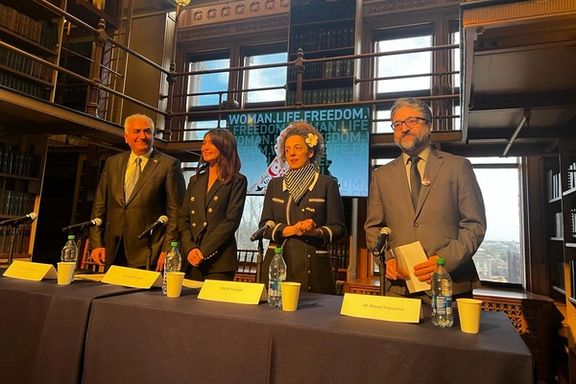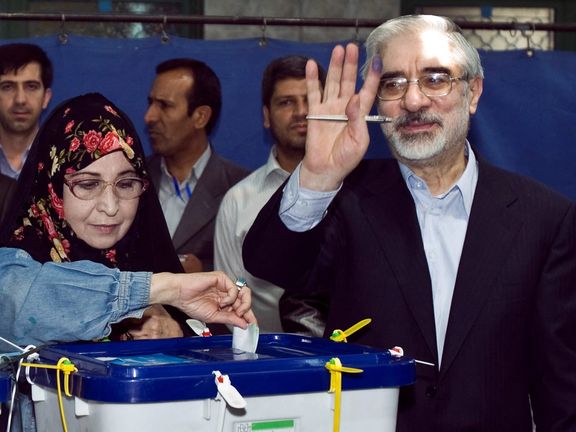Can Opposition Forces In Iran And Diaspora Create A United Front?

Five months into Iran's protest movement, an important question is whether the opposition in Iran and in the diaspora can unite to oust the Islamic Republic.

Five months into Iran's protest movement, an important question is whether the opposition in Iran and in the diaspora can unite to oust the Islamic Republic.
In the past few months, protesters on the streets have been looking up to some leading opposition figures abroad, particularly the exiled Prince Reza Pahlavi whose father was ousted by the Islamic Revolution of 1979 when he was still a teenager.
Many have hoped that the exiled prince and others, mainly activists and celebrities who have been campaigning against the regime, would form a united front, coordinate moves against the regime, lobby with western powers, and eventually assume the leadership of the revolution when the time comes.
Having to look up to the diaspora is in fact a situation imposed by the Islamic Republic which has practically eliminated, or forced into silence, any strong opposition figure or group inside Iran that could pose a danger to its existence.
Five months after the death in custody of Mahsa Amini sparked widespread protests in Iran, the opposition in diaspora seems to have come to an agreement to work together. Leading opposition figures – including exiled Prince Reza Pahlavi and seven others at an event Friday in Washington DC expressed their views and their vision of the future and said they are drawing up a manifesto for the revolution.
Meanwhile, Mir-Hossein Mousavi, who was a presidential candidate in 2009 and has been under house arrest since 2011, said in a statement a week earlier that fundamental change was required to “save Iran” and proposed elections to appoint a constitutional assembly to decide the future form of government and a referendum on the new constitution.

Mousavi’s rejection of the reform option in the Islamic Republic which puts him in the same boat as the diaspora figures . Many agree that declaring that the Islamic Republic is no longer reformable was a brave move on the part of Mousavi, a staunch believer in the Islamic Republic who served as its prime minister in the 1980s.
When asked by BBC Persian about the possibility of collaboration with Mousavi at the event Friday, Prince Reza Pahlavi said the diaspora opposition aims at “maximum participation” in the struggle against the regime and welcomes anyone who wants a secular Iran, not a reformed Islamic Republic.
“Reza Pahlavi’s response about Mousavi’s statement was diplomatic. In a way, he tried not to cause animosity…I hope his supporters will agree that Iranian politics is multi-faceted,” Mojtaba Najafi, a France-based academic tweeted referring to the many Pahlavi supporters’ strong objection to Mousavi and other reformists.
The former crown prince and the former prime minister in the Islamic Republic say the future form of the government should be decided by the people of Iran through the free election of a constitutional assembly and referendum.
In his short statement, Mousavi also called for cooperation among all political forces and figures who believe in preserving the country’s “territorial integrity” and “non-violence” to decide the transition from the Islamic Republic.
But differences between the political views of Pahlavi, other activists and Mousavi also run very deep, probably on many issues, as long as the former official has not acknowledged his responsibility in the misdeeds of the regime in the 1980s.
At the event, for instance, Prince Reza Pahlavi brought up an issue which could potentially be divisive: Relations with Israel.
When speaking about water crisis as one of Iran's major problems, he said Iran could seek assistance from “the best of Israeli experts”. He also referred to the former President Mahmoud Ahmadinejad who “wanted Israel not to exist at all” which implied he favors normal relations with Israel.
Mousavi and his supporters are now in agreement with the diaspora opposition that the people should decide the future form of government through a free vote, but although they may not call for Israel’s annihilation like Ahmadinejad and Khamenei, they are more likely to champion the Palestinian cause and be opposed to recognizing Israel.
However, Mousavi is not the leader of the young protesters in the streets, who seem to oppose a revolutionary foreign policy and favor good relations with regional countries.